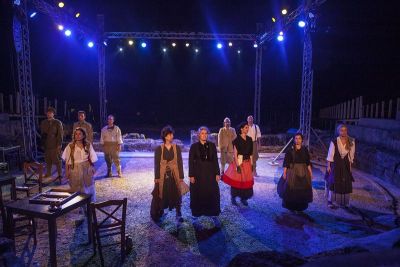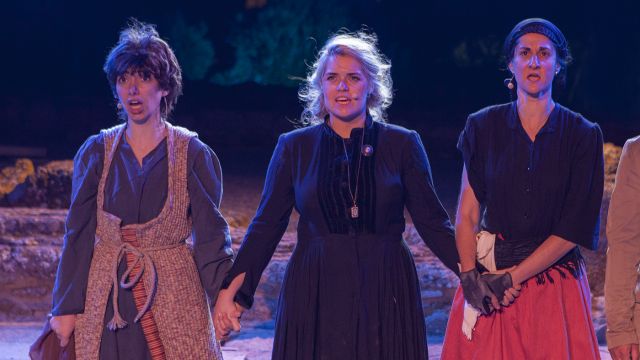Women in War
Numerous theatrical events have commemorated this year’s centenary of Gallipoli. New Australian contemporary opera Women in War takes quite a different tack, showing how World War 1 affected women, through the eyes of three contrasting characters.
Yeliz, played by Turkish mezzo-soprano Berna Anil, has lost her husband and has papers to release her son from the army to return to support her at home. Polyxeni, played by Greek contralto Irini Tzanetoulakou, has lost her husband, killed by a Turk, and is struggling to survive the war running her small café with her daughter. Clarice, played by Caitlin Spears, a recent music theatre graduate from VCA, is in love with an Australian officer, and decides to enlist as a nurse to follow her love. These three meet on the Greek Island of Lemnos and their stories intertwine.
Berna Anil has a rich voice and sang beautifully all night, though some words were lost on occasion. She was passionate and feisty, as was Irini Tzanetoulakou. Though Irini described herself as a contralto, her voice was much lighter than that of her Turkish colleague and I would have classified them differently. The animosity between the two made for a lot of fireworks.

Caitlin Spears was the only non-operatic voice in the cast, but that highlighted her youthful character. She worked well with the other women and her fiancée, Edward, who was played by tenor Tomas Manning Dalton. I worked with Tomas in a Gilbert and Sullivan opera ten years ago when he was a shy teenager, and this is the first time I have seen him in a significant role since. I am pleased to report that he is now a fully-rounded professional tenor, good-looking, with strong acting and an impressive voice.
Tenor Jason Wasley played the nasty orderly and coped reasonably well with the low tessitura. The role was obviously written for a baritone so he got little chance to shine vocally, but was a convincing villain.
The music was conventional and some appeared to have been borrowed from the period. The set comprised a large staircase going up to a walkway with tables and chairs on one side for the café. During blackouts for scene changes, we heard sounds of war, seagulls or people chatting.
Featuring a strong story line and powerful performances, this thought-provoking opera moved the audience. It deserves to be seen.
Graham Ford
Subscribe to our E-Newsletter, buy our latest print edition or find a Performing Arts book at Book Nook.

